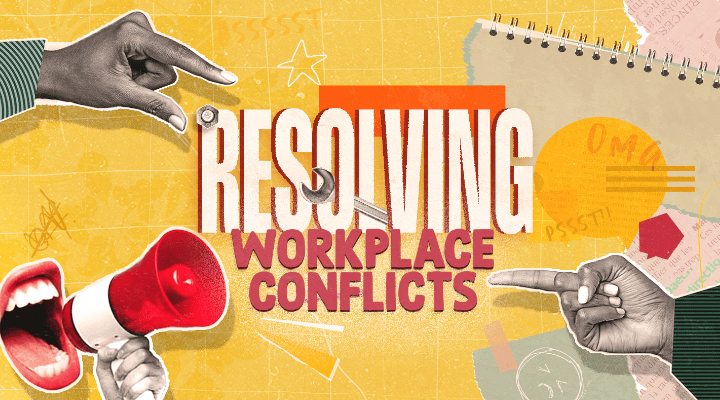Got Beef With A Colleague? A Playbook On Resolving Workplace Conflicts

Workplace conflicts are inevitable. No two people are the same, and when individuals from various backgrounds and different work styles come together, issues are bound to arise.
Regardless of the issue at hand, adopting a growth-oriented mindset can help to effectively resolve conflicts and strengthen workplace relationships.
Here are six key strategies to transform workplace conflicts into opportunities for growth:
1. Promptly Address Conflicts
Addressing conflicts head-on can be hard, but delaying resolution can compound the damage to an organisation. Unresolved conflict can potentially impact your team’s morale and cause diminished performance.
Don’t wait. Straightforward misunderstandings can often be swiftly resolved through open, honest discussions before they snowball.

2. Consider the Perspectives of Others
Conflicts with colleagues can arise naturally due to differences in viewpoints and communication styles. Instead of quickly assigning blame or presuming that one perspective is right and the other is wrong, it is essential to adopt a more open and empathetic approach.
Take time to genuinely listen and understand the perspectives of those involved in a conflict. When colleagues feel heard and valued, it cultivates a sense of respect, ultimately leading to more effective problem-solving.
3. Find Common Ground
An effective approach to managing workplace conflicts is to find common ground. Instead of determining who is right, shift your focus to finding solutions that accommodate all parties involved in the conflict.
For example, if you encounter challenges working with a colleague on a project due to differing work styles, you can agree on efficient working arrangements and task allocation to deliver high-quality work together.

4. Avoid Workplace Gossip
When we engage in or are subjected to unwanted gossip, it can lead to a hostile and unconducive workplace environment. Gossip often targets individuals and creates a sense of vulnerability and insecurity among those who are talked about.
As gossip spreads, it erodes trust among colleagues and can leave one feeling isolated, affecting their sense of belonging in the workplace.
We should strive to uphold a culture of respect, integrity, and open communication. It’s important to focus on the work at hand, rather than get entangled in workplace gossip.
5. Don’t Jump to Conclusions
When dealing with conflict, it’s easy to assume your colleagues’ motivations and jump to hasty conclusions. However, this results in miscommunication and can escalate workplace issues unintentionally.
Recognise that every person views the world through their unique lens influenced by personal experiences, biases, and beliefs. What may appear as an obvious conclusion to one person may not be the same for another.
Clarifying is often the most straightforward way to understand the perspectives of others before making judgments.

6. Manage Your Own Reactions
At its core, conflict management is about self-management. Addressing conflicts may not always be smooth sailing, but it is crucial to control your emotions when tackling these issues.
Emotions can cloud your judgement, so instead of uttering words that we may not truly mean or later regret, it’s important to pause and reflect before reacting emotionally to a conflict. After regaining composure, assess with a rational mind, then take proactive steps to resolve it.
Conflict Can Be Turned Into Opportunities
Although conflicts at work are unavoidable, they need not be considered a necessary evil.
By adopting a growth-oriented mindset, teams can transform stumbling blocks of conflict into stepping stones for progress and success.

Want more stories like this in your inbox? Subscribe to the Challenge newsletter.
- POSTED ON
Dec 18, 2023
- TEXT BY
Yoganeetha Sivakumar
- PHOTOS BY
Mandy Ong








